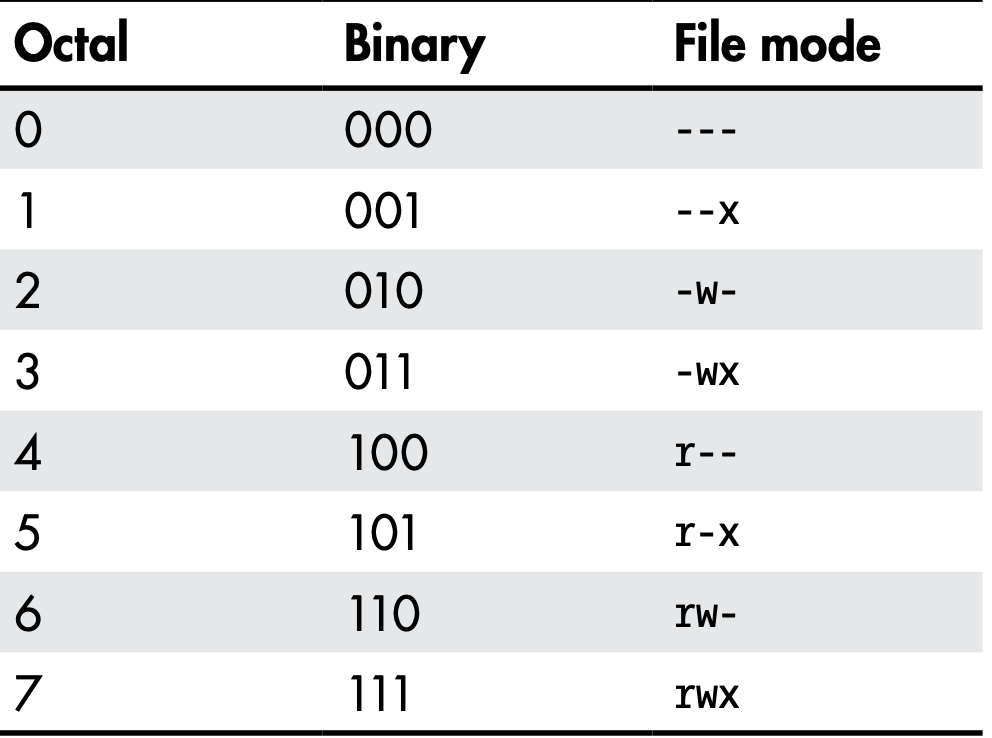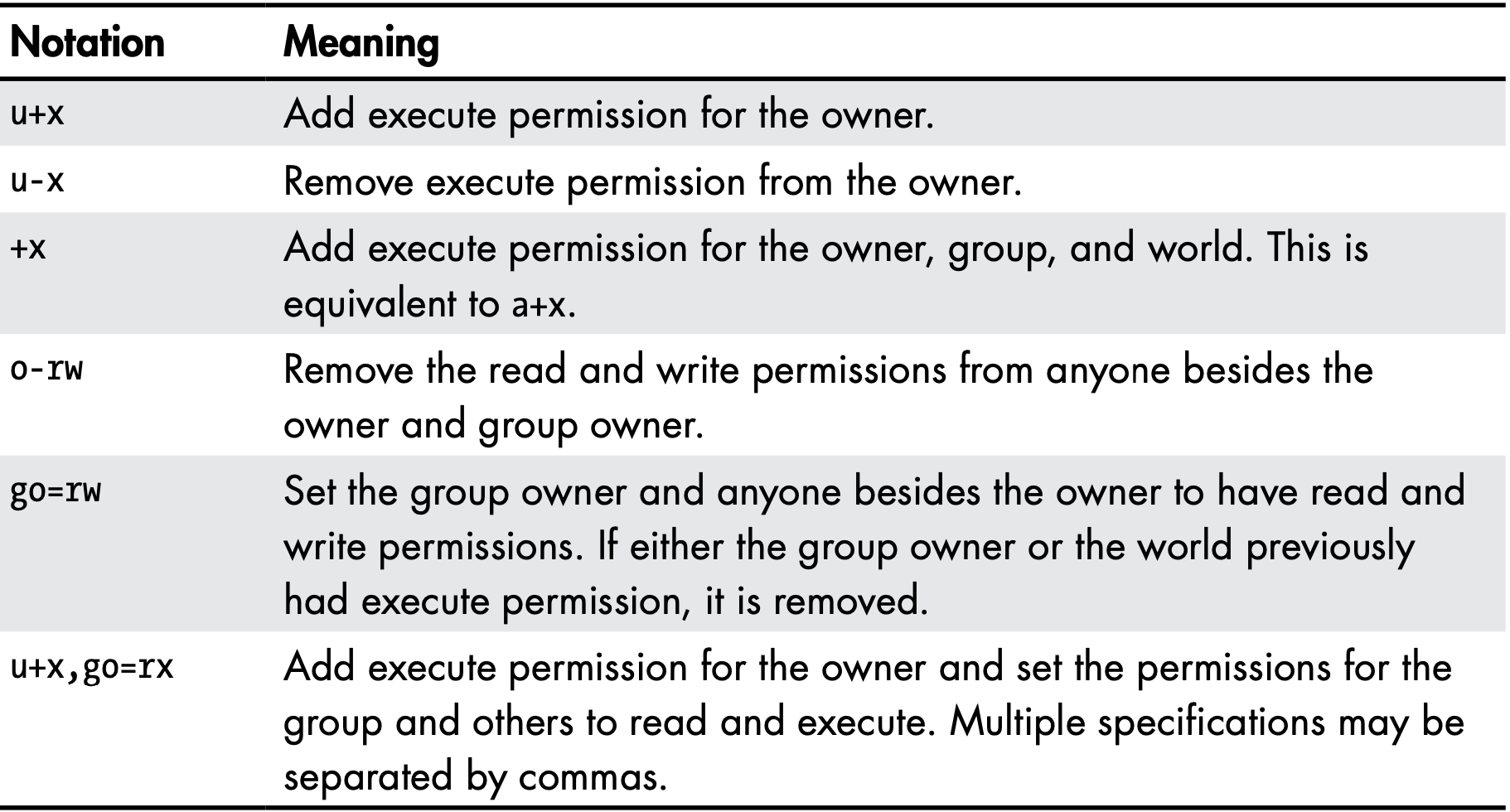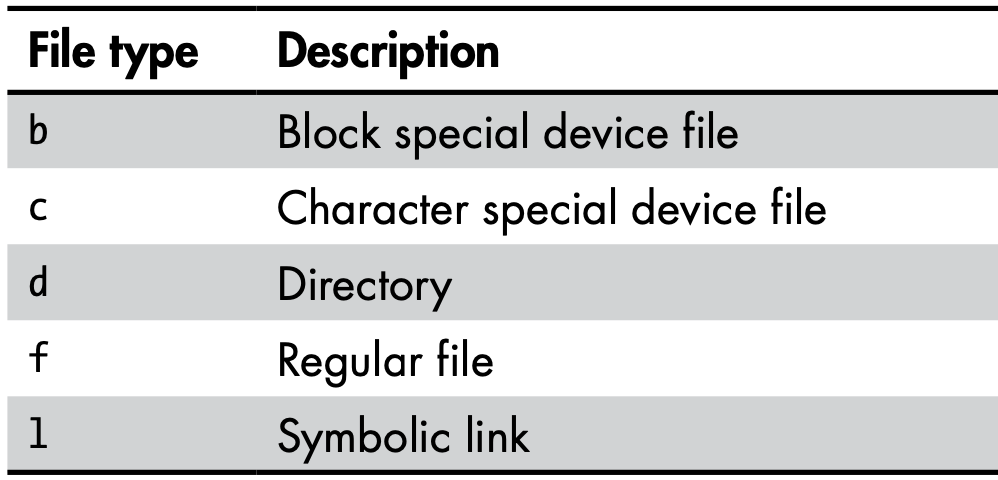Linux
The shell
Wildcards
Using wildcards (which is also known as globbing) allows you to select filenames based on patterns of characters.
Commonly Used Character Classes
Using wildcards makes it possible to construct sophisticated selection criteria for filenames.
redirecting files
I/O redirection allows us to redefine where standard output goes. To redirect standard output to another file instead of the screen, we use the > redirection operator followed by the name of the file.
1
2
3
4
└─# ls -l /usr/bin > ls-output.txt
└─# ls -l ls-output.txt
-rw-r--r-- 1 root root 246845 Apr 2 10:32 ls-output.txt
Redirecting Standard Error
What if the file does not exit and we don’t want the error to be displayed on the screen l.e
1
2
3
4
5
6
7
8
9
10
└─# ls -l /bin/usr > ls-output.txt
ls: cannot access '/bin/usr': No such file or directory
└─# cat ls-output.txt
└─# ls -l /bin/usr 2> ls-error.txt
└─# cat ls-error.txt
ls: cannot access '/bin/usr': No such file or directory
Redirecting Standard Output and Standard Error to One File
1
2
3
4
5
└─# ls -l /bin/usr > ls-output.txt 2>&1
└─# cat ls-output.txt
ls: cannot access '/bin/usr': No such file or directory
Disposing of Unwanted Output
Sometimes “silence is golden” and we don’t want output from a command. This applies particularly to error and status messages. The system provides a way to do this by redirecting output to a special file called /dev/null.
ls -l /bin/usr 2> /dev/null
wc: Print Line, Word, and Byte Counts
1
2
3
4
5
6
7
8
9
10
11
12
13
14
15
16
17
18
19
20
21
22
23
24
25
26
27
28
29
30
31
└─# wc -l sire | uniq
13 sire
└─# cat sire
XJ0YL-75IJD-222N3-45FE2
sire
sire
sire
sire
1
2
3
4
4
56
7
└─# cat sire | uniq
XJ0YL-75IJD-222N3-45FE2
sire
1
2
3
4
56
7
└─# cat sire | uniq | wc -l
9
Brace Expansion
With Brace Expansion, you can create multiple text strings from a pattern containing braces.
1
2
└─# echo Front-{A,B,C}-Back
Front-A-Back Front-B-Back Front-C-Back
Patterns to be brace expanded may contain a leading portion called a preamble and a trailing portion called a postscript. The brace expression itself may contain either a comma-separated list of strings or a range of integers or single characters. The pattern may not contain unquoted whitespace.
1
2
3
4
5
└─# echo Number_{1..5}
Number_1 Number_2 Number_3 Number_4 Number_5
└─# echo {01..15}
01 02 03 04 05 06 07 08 09 10 11 12 13 14 15
Here is a range of letters in reverse order:
1
2
└─# echo {Z..A}
Z Y X W V U T S R Q P O N M L K J I H G F E D C B A
Brace expansions may be nested.
1
2
└─# echo a{A{1,2},B{3,4}}b
aA1b aA2b aB3b aB4b
This method efficiently generates lists of files or directories, commonly used for organizing large collections such as images by “Year-Month” format, reducing manual input and potential errors.
1
2
3
4
5
6
7
8
9
10
11
└─# mkdir Photos
└─# cd Photos
└─# mkdir {2007..2009}-{01..12}
└─# ls
2007-01 2007-04 2007-07 2007-10 2008-01 2008-04 2008-07 2008-10 2009-01 2009-04 2009-07 2009-10
2007-02 2007-05 2007-08 2007-11 2008-02 2008-05 2008-08 2008-11 2009-02 2009-05 2009-08 2009-11
2007-03 2007-06 2007-09 2007-12 2008-03 2008-06 2008-09 2008-12 2009-03 2009-06 2009-09 2009-12
Command Substitution
Command substitution allows us to use the output of a command as an expansion.
1
2
└─# echo $(ls)
dir1 dir2 fun fun-hard fun-sym ls-error.txt ls-output.txt numbers Photos sire
or we can not limit it to just echo command, we can alse use the command find 
Adding the -e option to echo will enable interpretation of escape sequences. You can also place them inside $’ ‘
sleep 10; echo -e "Time's up\a"
AdvAnced KeyboArd TricKs
Cursor Movement
Modifying Text
Cutting and Pasting (Killing and Yanking) Text
Permission Attribute
File Modes in Binary and Octal
chmod Symbolic Notation
chmod Symbolic Notation Examples
Processes
Networking
ping
The ping command sends a special network packet called an ICMP ECHO_REQUEST to a specified host. Most network devices receiving this packet will reply to it, allowing the network connection to be verified.
1
2
3
4
5
6
7
8
9
10
11
12
13
┌──(root㉿kali)-[/home/sire]
└─# ping -c 5 linuxcommand.org
PING linuxcommand.org (216.105.38.11) 56(84) bytes of data.
64 bytes from secureprojects.sourceforge.net (216.105.38.11): icmp_seq=1 ttl=42 time=304 ms
64 bytes from secureprojects.sourceforge.net (216.105.38.11): icmp_seq=2 ttl=42 time=311 ms
64 bytes from secureprojects.sourceforge.net (216.105.38.11): icmp_seq=3 ttl=42 time=302 ms
64 bytes from secureprojects.sourceforge.net (216.105.38.11): icmp_seq=4 ttl=42 time=315 ms
64 bytes from secureprojects.sourceforge.net (216.105.38.11): icmp_seq=5 ttl=42 time=305 ms
--- linuxcommand.org ping statistics ---
5 packets transmitted, 5 received, 0% packet loss, time 4011ms
rtt min/avg/max/mdev = 301.845/307.189/315.205/4.984 ms
traceroute
The traceroute program (some systems use the similar tracepath program instead) lists all the “hops” network traffic takes to get from the local system to a specified host.
netstat
The netstat program is used to examine various network settings and statistics
1
2
3
4
5
6
7
8
9
10
11
12
13
14
15
┌──(root㉿kali)-[/home/sire]
└─# netstat -r
Kernel IP routing table
Destination Gateway Genmask Flags MSS Window irtt Iface
default 192.168.64.1 0.0.0.0 UG 0 0 0 eth0
10.0.3.0 0.0.0.0 255.255.255.0 U 0 0 0 lxcbr0
10.10.10.0 10.10.14.1 255.255.254.0 UG 0 0 0 tun0
10.10.14.0 0.0.0.0 255.255.254.0 U 0 0 0 tun0
10.129.0.0 10.10.14.1 255.255.0.0 UG 0 0 0 tun0
172.17.0.0 0.0.0.0 255.255.0.0 U 0 0 0 docker0
172.18.0.0 0.0.0.0 255.255.0.0 U 0 0 0 br-188301ac47c6
172.19.0.0 0.0.0.0 255.255.0.0 U 0 0 0 br-83d660d7963f
172.20.0.0 0.0.0.0 255.255.0.0 U 0 0 0 br-54f5e9f95c02
192.168.64.0 0.0.0.0 255.255.255.0 U 0 0 0 eth0
Searching for fileS
locate—Find Files the Easy Way
a rapid database search of pathnames and then outputs every name that matches a given substring locate bin/zip










